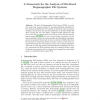ESORICS
2008
Springer
14 years 1 months ago
2008
Springer
Key agreement is a fundamental security functionality by which pairs of nodes agree on shared keys to be used for protecting their pairwise communications. In this work we study k...
ESORICS
2008
Springer
14 years 1 months ago
2008
Springer
Abstract. Different security notions and settings for identification protocols have been proposed so far, considering different powerful adversaries that can play "man-in-the-...
ESORICS
2008
Springer
14 years 1 months ago
2008
Springer
ESORICS
2008
Springer
14 years 1 months ago
2008
Springer
Abstract. The goal of Steganographic File Systems (SFSs) is to protect users from coercion attacks by providing plausible deniability on the existence of hidden files. We consider ...
ESORICS
2008
Springer
14 years 1 months ago
2008
Springer
Pervasive computing applications involve information flow across multiple organizations. Thus, any security breach in an application can have far-reaching consequences. However, ef...
ESORICS
2008
Springer
14 years 1 months ago
2008
Springer
In this paper we consider the problem of securely outsourcing computation on private data. We present a protocol for securely distributing the computation of the data structures u...
ESORICS
2008
Springer
14 years 1 months ago
2008
Springer
Abstract. Cryptographic protocols are useful for engineering trust in transactions. There are several languages for describing these protocols, but these tend to capture the commun...
ESORICS
2008
Springer
14 years 1 months ago
2008
Springer
We are interested in this problem: a verifier, with a small and reliable storage, wants to periodically check whether a remote server is keeping a large file x. A dishonest server,...
ESORICS
2008
Springer
14 years 1 months ago
2008
Springer
The UML is the de facto standard for system specification, but offers little specialized support for the specification and analysis of policies. This paper presents Deontic STAIRS,...
ESORICS
2008
Springer
14 years 1 months ago
2008
Springer
Delegation is a mechanism that allows a user A to act on another user B's behalf by making B's access rights available to A. It is well recognized as an important mechani...



